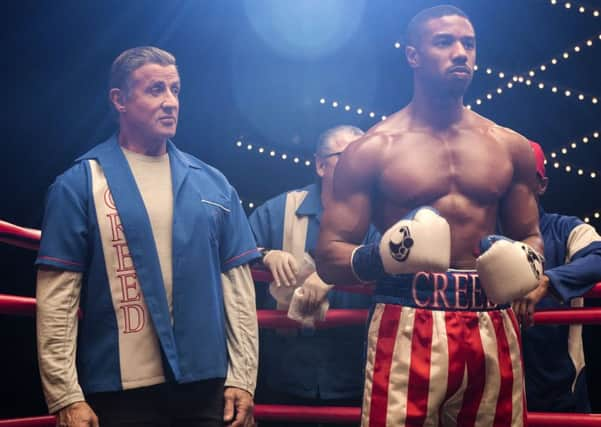Film reviews: Creed II | Ralph Breaks the Internet | Anna and the Apocalypse | Happy New Year, Colin Burstead | Three Identical Strangers | Disobedience


Creed II (15) ***
Ralph Breaks the Internet (PG) ***
Anna and the Apocalypse (12A) **
Happy New Year, Colin Burstead (15) ****
Three Identical Strangers (12A) ****
Disobedience (15) **
Ryan Coogler’s Rocky spin-off Creed did such a banging job of reviving Sylvester Stallone’s 40-year-old boxing saga that a sequel was inevitable. Using the same canny mix of a corny nostalgia and gritty revisionism, Creed II sees new franchise director Steven Caple Jr appropriate Rocky IV as the fan-servicing jumping off-point for a grudge match between Adonis Creed (Michael B Jordan) and the son of the man who killed his father.
That’s right, Dolph Lundgren is back as Ivan Drago, the Russian fighter who pummelled Apollo Creed to death 33 years earlier – only now, in keeping with the more realistic vibe of the new series, all of that film’s fondly remembered ridiculousness has been excised, replaced with a more downbeat exploration of Drago’s changed fortunes following his humiliating defeat by Rocky (Stallone) in his homeland.
Advertisement
Hide AdNone of which is necessarily a bad thing, setting up as it does a juicily melodramatic dilemma for Adonis, who’s goaded into fighting Drago’s man-mountain son (Florian Munteanu) as a way of laying to rest the ghost of his late father. But while it all fits together neatly enough, there’s something a little schematic about it too, and as the plot turns soapy the film doesn’t land its emotional punches as well as it did first time round. That said, the fight scenes are decent, Stallone’s still appealing, and when Bill Conti’s original theme kicks in, it’s impossible to resist. But please, no more.
Before Frozen, 2012’s Wreck-It Ralph provided the first signs that Disney Animation could once again be a serious challenger to sister studio Pixar thanks to an anarchic high-concept that imagined the inner lives of arcade game characters who could jump from one game to another. Sequel Ralph Breaks the Internet takes that idea to a crazy extremes with a plot that sees former videogame bad guy Ralph (John C Reilly) and glitchy best friend Vanellope (Sarah Silverman) escape the arcade via a new-fangled device called wi-fi and enter the information superhighway – a limitless place where they’re confronted with every corporate tech giant and Disney-owned property imaginable.
The film pulls some ingenious moves in figuring out how to represent the inner workings of the internet visually, but that doesn’t stop the self-referential humour starting to grate like a Shrek movie. Still, it redeems itself with a darker plot twist that ends up turning this feel-good family film into a surprisingly forthright takedown of misogynistic online trolling, so another win, but only just.
Taking a formalistically rigorous approach to its genre-mashing premise, Scottish zombie-themed Christmas high school musical Anna and the Apocalypse operates rather like an end-of-term festive show made by spirited amateurs blissfully unaware of its general naffness. Director John McPhail has admitted in interviews he didn’t really like musicals before signing on to make it, and that shows in the lifeless choreography, which is more filler than Thriller, something not helped by the disappointingly banal X Factor-style songs (by Roddy Hart and Tommy Reilly) and a weak script that lets the cast’s haircuts do most of the heavy lifting when it comes to characterisation. As for the horror elements, the use of zombies as a coming-of-age metaphor is promising but ineffectively exploited and the gore is about as effective at disguising the film’s overall dullness as a tacky bit of tinsel on a fake Christmas tree.
Seasonal shenanigans of a different sort course through Ben Wheatley’s new film Happy New Year, Colin Burstead, a nightmarish vision of familial disharmony starring Kill List’s Neil Maskell as the eponymous host of a New Year’s Eve get-together that starts going pear-shaped before his extended family even get through the door of the Downton Abbey-style heritage home he’s rented for them. Hayley Squires, Charles Dance, Bill Paterson and Doon Mackichan are among the top-notch cast Wheatley has assembled to play Colin’s squabbling relatives, but it’s Sam Riley’s appearance as the black sheep of the family that pushes everyone ever closer to the edge, particularly Colin, whose beleaguered, unappreciated effort to honour his family ties feels like an apt representation of the chaos of Brexit-era Britain.
Sticking with family, documentary Three Identical Strangers delves into the incredible true story of identical triplets separated at birth who were re-united by chance as students and became minor celebrities in early 1980s New York as the tabloids got wind of their story. The film investigates the mysterious scientific experiment behind their separation, and while saying any more risks ruining the experience of watching it, the way Brit director Tim Wardle gradually zooms out to show the devastation wrought upon their lives is both heartbreaking and chilling.
Advertisement
Hide AdSet in London’s orthodox Jewish community, Disobedience casts Rachel Weisz and Rachel McAdams as forbidden lovers whose passion for each other is reignited when Weisz’s Ronit returns from self-imposed exile in New York to attend the funeral of her estranged rabbi father. Based on Naomi Alderman’s 2006 novel, the film’s impossible love story can’t help but feel a little dated, not least because director Sebastián Lelio – who won this year’s best foreign language film Oscar for A Fantastic Woman – stacks the dramatic decks so much in favour of its protagonists that their dilemma feels a little quaint.